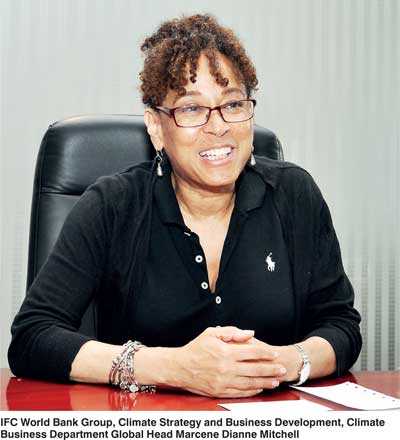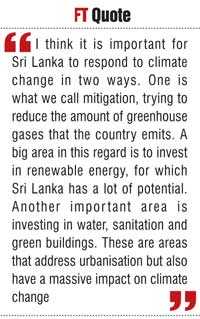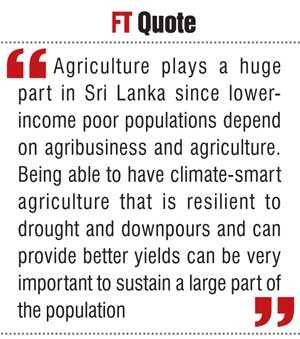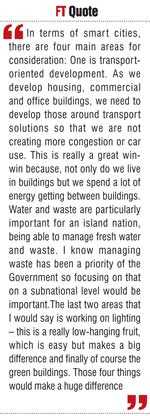Monday Feb 23, 2026
Monday Feb 23, 2026
Tuesday, 26 June 2018 00:00 - - {{hitsCtrl.values.hits}}
IFC’sGlobal Head of Climate Strategy and Business Development Marcene D. Mitchell was in Colombo recently and spoke to Daily FTon how Sri Lanka should respond to climate change and connected issues. She also spoke on Sri Lanka’s potential in terms of achieving the nationally-determined contributions to the Paris Climate Accord. Mitchell, who was in Sri Lanka for the first time, highlighted the potential of investing in green buildings for developers, hotels, banks, etc. Mitchell is an advocate for climate investment to encourage the transition to a low-carbon economy and protecting the environment. Following are excerpts:
By Jiwon Jung

Q: Could you tell us about IFC’s investment in sustainable business globally and the achievements, especially in Sri Lanka?
A: We have more than $18 billion investments worldwide in sustainable business. This goes beyond just green buildings; we are investing in renewable energy, industrial energy efficiency, waste, transport and other sectors. There are five main areas in which we have invested – cleanenergy, which includes energy efficiency and renewable energy; climate-smart agribusiness; cities, which includes transport and water and waste; green buildings; and green finance because about 40% of our business in general is through financial institutions. Helping them green their portfolio is one of our main objectives.
Q: In IFC’s perspective, why should the private sector and Government focus on sustainability?
A: We are a development organization,anda part of the World Bank Group. Our objective, goal and mission are to reduce poverty and boost shared prosperity. We recognise that if we don’t address the impacts of climate change, we will not be able to achieve these goals because every year we find that there are billions of dollars being spent to address the impact of natural disasters. There is also the threat of one hundred million people falling back into poverty by 2030 if we don’t address climate change.

These are big issues impacting all the gains that we have made inreducing poverty. We can’t reverse them if we do not deal with climate change, the impact of which obviously falls on the most vulnerable in our communities. From a development and economic point of view, dealing with climate change is a huge imperative. Even in Sri Lanka, natural disasters can cost a percentage of your GDP. As things worsen, it will lead to higher economic cost. It is vital thatthe Government and private sector address climate change.
Q: How and what is IFC doing regionally and any specific initiatives in Sri Lanka?
A: As I said, we work in these five areas, generally speaking, in South Asia. In Sri Lanka, in particular, we’re looking at areas of urban development, which is really important since there is a huge upsurge of growth in the island. We help with industrial aspects of growth objectives in line with the Government’s agenda. We also work with the Government to structure Public-Private Partnerships. These are particularly important since the public sector simply cannot make the investments required on its own. As such, it is important to bring in the private sector and benefit from the capital, innovation and know-how it can bring, particularly in renewable energy and energy efficiency.
Q: How should Sri Lanka respond to climate change?
A: I think it is important for Sri Lanka to do this in two ways. One is what we call mitigation, trying to reduce the amount of greenhouse gases that the country emits. A big area in this regard is to invest in renewable energy, of which Sri Lanka has a lot of potential. Another important area is investing in water, sanitation and green buildings. These are areas that address urbanisation but also have a massive impact on climate change.
Sri Lanka as an island nation also needs to think about ways to adapt to the climate changes that are coming. A rise in sea levels is something that is really impactful as development in Sri Lanka happens around the coastline. We must think about how rising sea levels will impact such development.

Agriculture plays a huge part in Sri Lanka since lower-income groups depend on agribusiness and agriculture for a living. Being able to have climate-smart agriculture that is resilient to drought and downpours and can provide better yields can be very important to sustain a large part of the population. Therefore, both adaptation and mitigation are crucial things for Sri Lanka in responding to climate change.
Q: In relation to the UN’s Sustainable Development Goals (SDGs), what do you think that Sri Lanka has to focus on the most?
A: We talked a lot about agriculture, which will be important in the future. We have also talked about the necessity of bringing in the private sector to help with some of the investments the Government needs to have in terms of clean energy and energy access. IFCis also highly focused on gender issues, so it will be important to make sure that as we make these changes in our economy, we do it in an inclusive way to includewomen in economic growth.
Q: Are there any specific areas where Sri Lanka could hope for quick wins on its climate targets as per the Paris Climate Accord?
A: According to the Paris Climate Accord, all countries have made commitments in terms of how they are going to contribute to the treaty. It is called the intended Nationally Determined Contributions (NDCs). One of the larger contributionsfor Sri Lanka has been to build green and resource-efficient buildings. Sri Lanka is working on a green building code to try to mandate some of these changes. Butthere are challenges in terms of implementation. This could possibly be a quick win and is something that IFC can help the Government put into action. We have a lot of experience not only in establishing green building codes, but also in helping governments implement them. The potential for using the private sector to help on the voluntary side as well as to help the Government ensure people are buying into the building codes will become a particularly quick win since the codes are already in place.

Q: An IFC study estimated up to $18 billion of climate investment opportunity in cities and infrastructure in Sri Lanka. Could you tell us a little more about this research?
A: We looked at what the Government pledged to do in terms of its NDCs and then, for example, in areas of green buildings or renewable energy, we asked, ‘Where do you want to get to by 2025 or 2030?’ Thenwe looked at the current state and, we basically put a value on how much investment is needed to get between the current situation, and where the Government is pledging to go. That gap is the $18 billion. If the country, not just the Government but also the private sector, is able to achieve the NDCs, there will bethe opportunity for this type of investment.
Q: Globally, with increased urbanisation, we are seeing the rise of more smart cities and green buildings. As Sri Lanka grows, is there any advice for us to do so sustainably?
A: I would say, in terms of smart cities, there are four main areas. One is transport-oriented development. As we develop housing, commercial and office buildings, we need to effective transport solutions so that we are not creating more congestion or car use. This is a great win-win because not only do we live in buildings, but we also spend a lot of energy getting between buildings.
Second, being able to manage fresh water and waste are particularly important for an island nation. I know managing waste has been the priority of the Government so focusing on that on a subnational level would be important.
The last two areas that I would say is working on lighting – this is a low-hanging fruit, which is easy but makes a big difference and finally of course, green buildings. Those four things would make a huge difference.
Q: What is IFC doing in this space?
A: IFC has a cities’ program. We have the ability to invest directly in municipalities. We also have an advisory program that helps the municipality structure Public-Private Partnerships and we have the ability to invest in private companies that are providing services to the Government. Those are three ways in which we can directly invest.As part of our cities’ program we also provide technical assistance for cities to help them determine the best solutions.
Q: With regards to green buildings, could you tell me more about this and IFC’s EDGE certification program?
A: I have talked a lot about green buildings and the way that IFC is addressing this is through our EDGE market transformation program. It combines working with governmentson the building codes and incentives, as well asvoluntary certification. We have a software that helps developers design green buildings so they can understand what it means to design green. The software provides a quantitative approach to building green with the inclusion of a financial calculation tool that helps them look at the extra costs and return on investments to build green. Many people think that it will cost 30% more to build green but we are finding that it only costs 1-2%. This softwareallows the developers to understand that building green is cost-effective.
Second, we have a standard that says, “To build green, a building must earn a minimum of 20% less energy, water and embodied energy in materials, compared to current building practices in the country.”This standard allows people to know exactly what is required to be an EDGE-certified green building.
Finally, we have a certification program for over 140 countries that allows companies and owners to have a third-party certify that they are actually implementing the features that make them green. It gives developerscredibility withinthe market and allows the owner to see exactly what they are getting. This is part of our transformation program and we are here in Sri Lanka to discuss it – not only with the development communities, but also with banks and Government agencies because it takes anentire ecosystem to transform the market.
Q: What inspires you the most?
A: What inspires me is looking at climate not for the risks, but for the opportunities. What I have seen is so much creativity and invention that comes out when trying to solve these problems. I find that really inspiring. The changing climate does pose a lot of risk for us, but it is also an opportunity for us to come up with new solutions, things that can help people and find ways in which we can be both friendly to the planet but also be more resource-efficient. For example, in agriculture, it really helps individual farmers to lower their costs if they know how to use the latest technologies, using water and fertilisers specifically, or even satellites to view their plants. This type of creativity, invention and innovation is what excites me.
Pix by Ruwan Walpola
